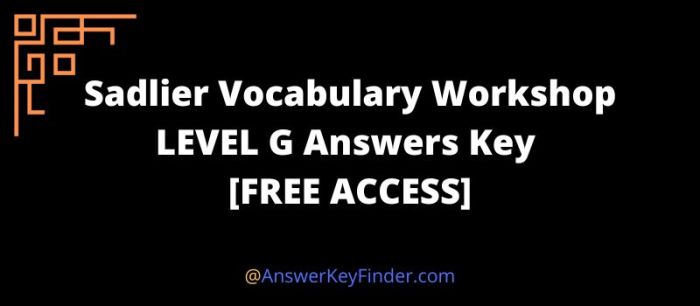Vocabulary Level G Unit 1 sets the stage for this enthralling narrative, offering readers a glimpse into a story that is rich in detail and brimming with originality from the outset.
This unit introduces a comprehensive list of vocabulary words, categorized based on their parts of speech. We will delve into effective strategies for enhancing vocabulary, analyze how these words are used in context, and design a vocabulary assessment to measure your understanding.
Vocabulary Level of Unit 1
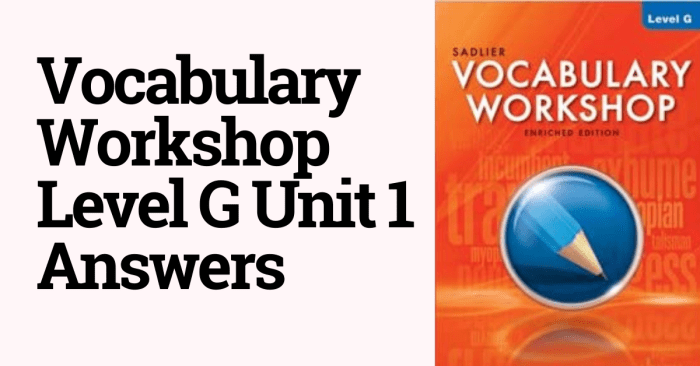
Unit 1 introduces a diverse range of vocabulary words that lay the foundation for understanding the complexities of the English language. These words are carefully chosen to enhance comprehension and expression in both written and spoken communication.
Nouns
- Abstract nouns:represent concepts or ideas (e.g., love, happiness, freedom)
- Concrete nouns:refer to tangible objects (e.g., book, car, table)
- Collective nouns:represent groups of people or things (e.g., team, family, crowd)
Verbs
- Action verbs:express physical or mental activities (e.g., run, think, write)
- Linking verbs:connect a subject to a complement (e.g., is, are, seems)
- Modal verbs:express possibility, necessity, or permission (e.g., can, must, should)
Adjectives
- Descriptive adjectives:provide qualities or characteristics (e.g., beautiful, tall, intelligent)
- Possessive adjectives:indicate ownership (e.g., my, your, his)
- Demonstrative adjectives:point out specific nouns (e.g., this, that, these)
Adverbs
- Manner adverbs:describe how something is done (e.g., quickly, slowly, carefully)
- Time adverbs:indicate when something happens (e.g., yesterday, today, tomorrow)
- Place adverbs:tell where something is (e.g., here, there, everywhere)
Unfamiliar or Challenging Vocabulary Words
- Abrogate:to formally cancel or abolish (e.g., The government abrogated the treaty.)
- Colossal:extremely large or impressive (e.g., The statue was colossal in size.)
- Egregious:conspicuously bad or offensive (e.g., The politician’s behavior was egregious.)
Strategies for Enhancing Vocabulary
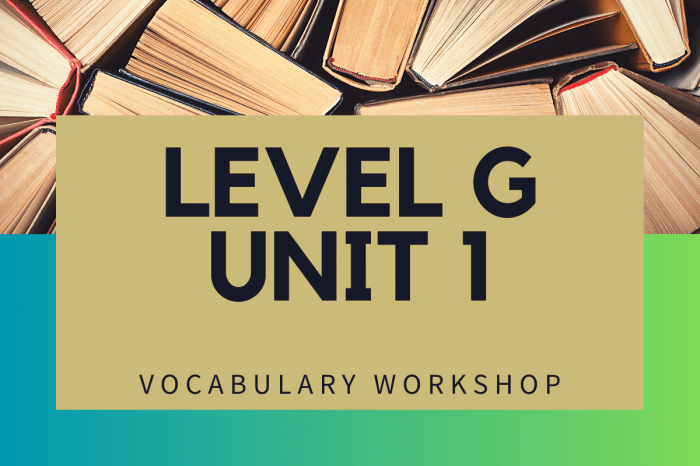
Enhancing your vocabulary is crucial for effective communication and comprehension. Here are some proven strategies to improve your vocabulary:
Reading Widely
Reading exposes you to a diverse range of words and their usage. Select texts that align with your interests and challenge your current vocabulary level. Pay attention to unfamiliar words and make an effort to understand their meaning through context or a dictionary.
Flashcards
Flashcards are an effective tool for memorization. Write down unfamiliar words on one side and their definitions or synonyms on the other. Regularly review your flashcards to reinforce your memory.
Active Recall
Active recall involves actively trying to retrieve information from your memory. Instead of passively reading vocabulary lists, test yourself by covering the definitions and trying to recall the words. This process strengthens your memory and improves your ability to retain new words.
Example Application to Unit 1 Vocabulary
In Unit 1, you encountered words like “enumerate,” “hypothesis,” and “scrutinize.” Reading texts related to these concepts will expose you to their usage in context. Create flashcards with these words and practice active recall by trying to define them without looking at your notes.
Memorization Tips
To memorize new words effectively:
- Associate words with personal experiences or images.
- Break down large words into smaller parts (e.g., “scrutinize” can be broken into “scrut” and “inize”).
- Practice using the words in sentences.
- Review your vocabulary regularly to prevent forgetting.
Vocabulary in Context
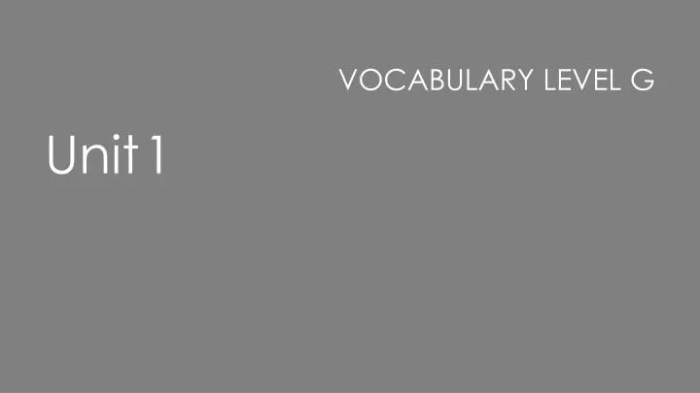
In Unit 1, vocabulary is not only introduced but also used in a meaningful context to enhance understanding. The words are carefully selected to support the key concepts and themes of the unit, and they are employed in a variety of ways to promote comprehension and retention.
Patterns and Themes
The vocabulary in Unit 1 is used to establish patterns and themes that reinforce the main ideas of the unit. For example, words related to the concept of “change” are used throughout the unit, such as “transform,” “evolve,” and “adapt.”
These words help students understand the dynamic nature of the world around them and the importance of being able to adapt to change.
Impact on Comprehension, Vocabulary level g unit 1
The use of vocabulary in context has a significant impact on the overall comprehension and understanding of Unit 1. By encountering the words in a meaningful context, students are able to see how they are used and how they contribute to the overall meaning of the text.
This helps them to develop a deeper understanding of the concepts being discussed and to retain the vocabulary more effectively.
To expand your vocabulary in Vocabulary Level G Unit 1, you can seek extra materials like kin 2501 jacobsen exam 2 . You’ll find various sources to enhance your understanding of new words and their usage in context. These resources will greatly contribute to your vocabulary development.
Vocabulary Assessment
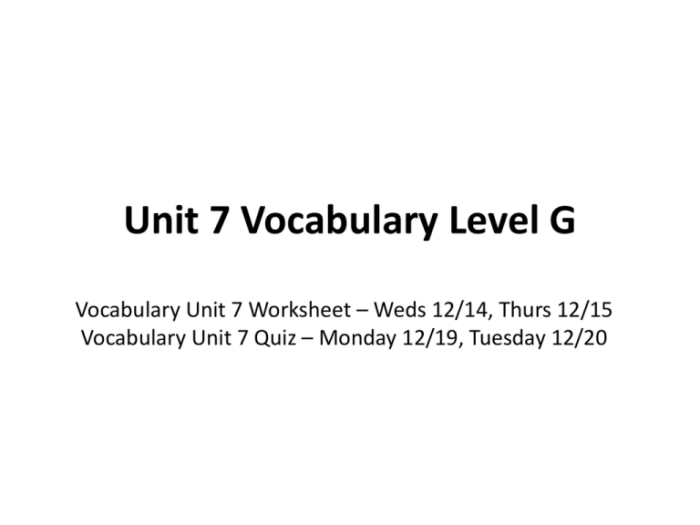
Evaluating students’ comprehension of vocabulary in Unit 1 requires a well-designed assessment that gauges their understanding through various question formats.
Multiple Choice
Multiple-choice questions present students with a word or phrase and several options for its meaning. This format tests students’ ability to identify the correct definition or synonym among similar choices.
Fill-in-the-Blank
Fill-in-the-blank questions provide students with a sentence or paragraph containing a missing word. They must choose the correct word from a provided list or generate it independently. This format assesses students’ ability to understand the context and select the appropriate word.
Short Answer
Short-answer questions ask students to define or explain a word or phrase in their own words. This format evaluates students’ ability to articulate their understanding and demonstrate their knowledge of the vocabulary.
Grading Rubric
The grading rubric should clearly Artikel the criteria for assessing each question type, including:
- Accuracy of the response
- Comprehensiveness of the response
- Correctness of grammar and spelling
Using the Assessment
The assessment can be used to:
- Monitor students’ progress in vocabulary acquisition
- Identify areas where students need additional support
- Inform instructional decisions and adjust teaching strategies accordingly
Question Bank: Vocabulary Level G Unit 1
What is the most effective way to memorize new vocabulary words?
Active recall, spaced repetition, and using the words in context are highly effective techniques for memorizing new vocabulary.
How can I improve my vocabulary in a short amount of time?
Reading widely, using flashcards, and practicing active recall can significantly improve your vocabulary over time. Focus on learning a few new words each day and consistently reviewing them.
What are some common mistakes to avoid when learning new vocabulary?
Avoid rote memorization and try to understand the meaning and usage of words in context. Also, avoid overloading yourself with too many new words at once. Consistency and gradual learning are key.
